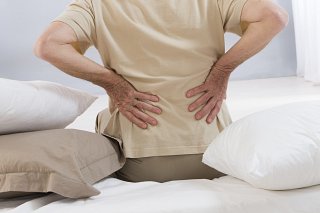Mattress Buying Guide

I often give my new clients a single page mattress buying guide when they look for advice in buying a new mattress - but want to ensure that their investment alleviates back discomfort and pain.
Before we proceed with our mattress buying guide, please remember that you spend almost one third of your life in bed - sleeping! Selecting the correct mattress for your back is crucial for your health. Your body needs to be able to relax in a good postural position so that it can recover from its day’s work and respond well to the demands of the next one. Many people who have a bad back miss the opportunity to help improve their back pain by not doing their research and buying the wrong type of mattress for them.
Choosing a mattress type for your posture
If you have a bad back, or suffer from back pain, particularly while sleeping, then choosing a mattress to prevent and treat back pain is something that can really help you. It is well discussed topic in the physiotherapy and health world. However, remember that choosing a mattress is both a subjective and objective matter.
-
Subjectively - you must feel comfortable lying on your mattress. Try plenty of mattress in the shop and compare how you feel lying on them (remember to wear clean socks on the day!)
- Objectively - I advise people on the type of mattress to look for, and give guidance on the mattress types I think may help in the treatment, prevention and ultimate resolution of their back pain and stiffness.
Examples of Mattresses for bad backs.
Mattress for Lumbar Lordosis: If you have a stiff lower back - and have a deep curve at the base of your spine that does not flatten to the ground naturally when you lie down,(known as an increased lumbar lordosis) - then I usually advise a mattress that is supportive but not too hard. In my experience if you have an increased lumbar lordosis and sleep on a hard mattress your spine can remain arched in your sleep while you are lying on your back. Clients with this back posture often find that they wake up with increased back pain in the morning if they have been sleeping on their backs. They tend to sleep on their sides to avoid this pain. However, if their mattress is a little softer, they find sleeping on their backs is not a problem.
Mattress for Flexed Posture: Another example is if you a flexed lower back (known as a flat back) and you tend to slouch when you sit. In such cases your back will tend to benefit more from a firmer style mattress. If your flexed lower back is not supported enough, back pain problems may worsen over time, as a softer bed encouraging and supporting your flexed posture, allowing it into further flexion while you sleep.
These are just two examples, but ultimately you need to understand what your posture type is, or what the underlying cause of your back pain is. Once you have discovered this, then it will help you choose the best mattress for your back pain.
If unsure, ask your physiotherapist/Physical Therapist to help you on this one! I recently had a client who spent 3000 euro on a bed and having assessed her symptoms, it was clear that the new bed was cause of her hip pain! As you can imagine, my diagnosis was not very popular! I have seen many more who missed an opportunity to help improve or relieve their back pain by buying a mattress without doing their research first.

Other things to consider when buying a mattress
Also, I think it is also worth pointing out that there are many environmental factors you should consider in choosing a correct mattress. Most modern mattresses are chemically treated, and if manufactured poorly, will result in high solvent levels that we absorb and inhale into our bodies night after night.
Where possible it is preferable to buy a non-toxic mattress, preferably made from natural fibres. These are typically not treated with chemical flame retardants like PBDE and are made from organic cotton, wool and coir(coconut fibre). This is worth bearing in mind if you are considering a mattress, or pillow, made from a memory foam such as polyurethane.
The cost of your mattress is not always indicative of its quality and effectiveness in the treatment of back pain. Sometimes a cheap mattress can tick all the boxes that your back requires. However, in my experience with mattress-buying - you often have to pay more to get a well manufactured mattress that has fewer chemicals in its makeup, which I firmly believe is very important with respect to your general health.
So, that’s the basic mattress buying guide - do your research - both on the types and features of mattresses available and on your lying posture type before you open your wallet!
DISCLAIMER
While the content and materials contained in the articles on this website have been written & researched by Sally Ann Quirke, a professional, practising & fully qualified Chartered Physiotherapist (Physical Therapist) based in Ireland, they are provided for general information and educational purposes only. They do not constitute medical advice on any particular individual situation. Please see your Chartered Physiotherapist or other medical practitioner for full and individual consultation.
Please read the full disclaimer here.
Cookies and Privacy
By using this website, you consent to the use of cookies in accordance with our cookie policy. For more information on how we use cookies, please read our cookie policy here.
